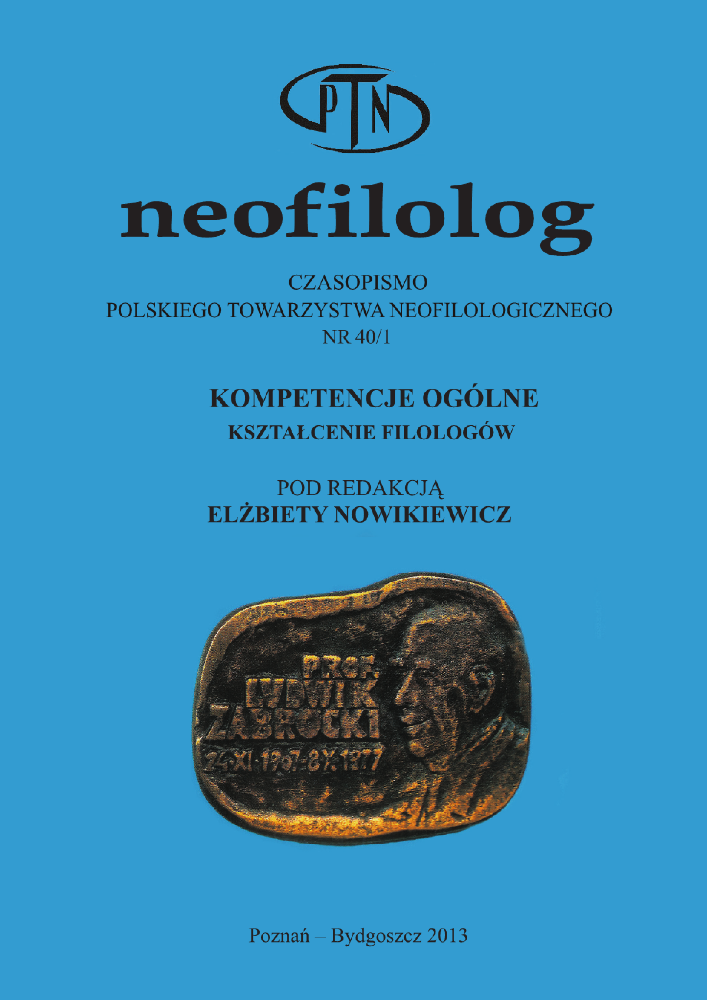Abstract
This article presents a theoretical discussion, supported by empirical research, about the attitudes of university teachers of foreign language in Poland towards the implementation of the National Qualification Framework for Higher Education. The opinions on the topic were collected by a questionnaire, conducted in March 2012, among representatives of 17 Polish universities. The research aimed to investigate whether institutional and administrative change connected with the reform of higher education in Poland is in any way contributing to reframing of competencies, or to the development of new competencies in foreign language teachers and researchers. The inter-nationalization of tertiary education and demands for orientation to the job market, widely discussed in literature and public debate recently, are irreversibly connected with globalization and the Bologna process. It is important to raise the question how this affects the generic and specific competencies of teacher trainers and educators. The research results revealed that academics are highly sceptical about the assumptions and effects of the implementation of the NQF. It is the author’s intention to diagnose the reasons for this in the context of seeing the NQF as creating new space for modi-fied and redefined skills, which are indispensable in the new educational reality.
References
Arends, R. J. 1994. Uczymy się nauczać. tłum. K. Kruszewski. Warszawa: WSiP.
Banach, C. 2005. « Nauczyciel wobec reformy systemu edukacji ». (w) Nowe w Szkole, Nr 7-8. 83-84. Dostępne na: http://scholaris.pl.
Czerepaniak-Walczak, M. 1995. Między dostosowaniem a zmianą. Szczecin: Wydawnictwo Naukowe Uniwersytetu Szczecińskiego.
Dylak, S. 1995. Wizualizacja kształtowania nauczycieli. Poznań: Wyd. UAM.
Fullan, M. 1993. « The complexity of the change process ». (w) Change forces: Probing the depth of educational reform, pp. 19-41. Falmer Press. Dostępne na: http://www.personal.psu.edu/wxh139/Fullan.htm DW 10.08.2012.
Goźlińska, E. i Szlosek, F. 1997. Podręczny słownik nauczyciela kształcenia zawodowego. Radom: ITeE.
Jaroszewska, A. 2008. « Analiza kompetencji nauczycieli języków obcych w kontekście nauczania w różnych grupach wiekowych ». (w) Nauczyciel języków obcych dziś i jutro. (red. M. Pawlak, A. Mystkowska-Wiertelak i A. Pietrzykowska). Poznań-Kalisz: WPA UAM: 83-96.
Kacprzak, L. 2006. Pedeutologiczne rozważania o nauczycielu. Piła: Wyd. PWSZ.
Kupisiewicz, Cz. 2005. Podstawy dydaktyki. Warszawa: WSiP.
Lange, O. 1965. Ekonomia polityczna. Warszawa: PWN.
Męczkowska-Christiansen, A. 2002. Od świadomości nauczyciela do konstrukcji świata społecznego : nauczycielskie koncepcje wymagań dydaktycznych a problem rekonstrukcyjnej kompetencji ucznia. Kraków: Oficyna Wydawnicza „Impuls”.
Mohamedbhai, G. 2012. Internationalization and Global Responsibility, referat wy-głoszony na konferencji British Council: Going Global 2012, May 14, 2012. Dostępne na: http://www.insidehighered.com/blogs/world-view/internationalization-and-global-responsibility#ixzz2B5dLZ9wJ DW 2.11.2012.
Mohamedbhai, G. 2008. The Effects of Massification on Higher Education in Africa. Association of African Universities.
Pfeiffer, W. 2001. Nauka języków obcych. Od praktyki do praktyki. Poznań: Wagros.
Raport na temat polityki edukacyjnej w Polsce. OECD. 1995. W-wa: WSiP.
Ryan, T. G. 2007. The Reflexive Classroom Manager: A Required Pre-Service Mode Networks: Vol. 9, Issue 1.
Stach, K. 2002. « Kompetencje zawodowe nauczyciela – spojrzenie na problem ». (w) Kompetencje nauczyciela wychowawcy (red. K. Ferenz i E. Kozioł). Zielona Góra: Oficyna Wydawnicza Uniwersytetu Zielonogórskiego. 19.
Śliwerski, B. 2010. « Inkontrologia pedagogiczna, czyli o wartości spotkania ». http://sliwerski-pedagog.blogspot.com/2010/04/inkontrologia-pedagogiczna-czyli-o.html DW 2.11.2012
Zawadzka, E. 2004. Nauczyciele języków obcych w dobie przemian. Kraków: Oficyna Wydawnicza „Impuls”.
License
Copyright (c) 2019 Neofilolog

This work is licensed under a Creative Commons Attribution-NoDerivatives 4.0 International License.
Authors
Authors of texts accepted for publication in Neofilolog are required to complete, sign and return to the Editorial team’s office the Agreement for granting a royalty-free license to works with a commitment to grant a CC sub-license.
Under the agreement, the authors of the texts published in Neofilolog grant Adam Mickiewicz University in Poznań a non-exclusive, royalty-free license and authorize the use of Attribution-NoDerivatives 4.0 International (CC BY-ND 4.0) Creative Commons sub-license.
The authors retain the right to the free disposal of the work.
Users
Interested Internet users are entitled to use works that have been published in Neofilolog since 2017, under the following conditions:
▪ attribution – obligation to provide, together with the distributed work, information about the authorship, title, source (link to the original work, DOI) and the license itself.
▪ no derivatives – the work must be preserved in its original form. Without the author's consent, it is not possible to distribute the modified work in the form of translations, publications, etc.
Copyrights are reserved for all texts published since 2017.
Miscellaneous
Adam Mickiewicz University in Poznań retains the property right as a whole (layout, graphic form, title, cover design, logo etc.).
